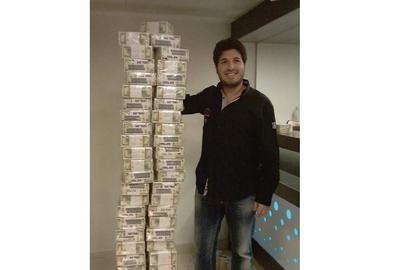A notorious gold smuggler conducted hundreds of millions of dollars in transactions for the Iranian regime right under the noses of Dubai bank managers, a cache of documents has revealed.
The Iranian-Turkish tycoon Reza Zarrab, 34, was indicted by a grand jury in the US last year for conspiring to evade sanctions, money laundering and bank fraud. He is facing up to 95 years in prison.
Leaked documents from the US Financial Crimes Enforcement Network (FinCEN) show that one of the companies Zarrab controlled, the Dubai-based Gunes General Trading, processed $142million for Tehran in 2011 and 2012.
Even after a British bank blew the whistle on the hundreds of suspicious transactions, the firm was able to process another $108m by switching from the Central Bank of the UAE, which ignored the warning, to two local banks: Rakbank and the National Bank of Dubai (NBD).
The damning evidence was unearthed by a consortium of journalists working on a huge leak of 2,500 documents from FinCEN, which mostly comprises suspicious activity reports or SARs, detailing nearly $2trillion of transactions that show how banks have allowed criminals to move dirty money around the world.
Who is Reza Zarrab?
In 2013 Reza Zarrab, an Istanbul-based enjoying a lavish lifestyle together with his pop-singer wife and associates, was arrested in a wide-ranging crackdown on corruption in the country. Prosecutors accused him of gold-smuggling for the Iranian regime and using “ghost” companies to buy oil and gas from Iran, bribing senior Turkish officials to turn a blind eye with gifts that included a $350,000 watch, a $37,000 piano and $500,000 in a chocolate box.
Initially Zarrab denied the allegations and was released after 70 days in detention. But in 2016 he inexplicably took a trip to Disney World with his wife and daughter – and was promptly arrested by the US authorities. It transpired Zarrab had used a complex network of shell companies to send more than $13billion from Turkey to Iran in 2013 and 2014, also creating fake invoices for billions more in bogus humanitarian aid to Iran.
The sensational case attracted little international attention at the time. Jonathan Schanzer, senior vice president of research at the Foundation for Defense of Democracies, writes: “It was an inconvenient moment to reveal unsavory truths about Iran, amid the push for the nuclear agreement.”
In a dramatic turn of events, Zarrab pled guilty to all charges against him in a Manhattan court in November 2017 and became the prosecution’s star witness in a case against Hassan Atilla, a Turkish banker, for his part in a multi-billion-dollar oil-for-gold scheme with Iran. His seven-day testimony also revealed he had made up to $150 million in commissions for secretly moving Iranian oil and gas money through American banks in violation of U.S. sanctions.
What Else did the FinCEN Leaks Reveal?
Journalists involved in the FinCEN investigation have uncovered details about Zarrab’s record-breaking sanctions-busting scheme that implicate politicians across the globe in the fraud – including former Iranian president Mahmoud Ahmadinejad.
According to Zarrab’s ex-courier Adem Karehan, speaking on-record to Courthouse News, Zarrab took a large quantity of cash – euros, dollars and UAE dirham – with him to a meeting with Ahmadinejad in 2011, leaving him with the impression that the head of state had taken a bribe.
Ahmadinejad is a friend of Zarrab’s father and would have known of his activities from December 2011 at the very latest, when Zarrab wrote to him in response to to Ayatollah Khamenei’s call for “economic jihad” to beat the sanctions. “The Zarrab family... considers it to be our national and moral duty to declare our willingness to participate,” he had written.
Zarrab’s father, the Iranian businessman Hossein Zarrab, has also fallen foul of international law enforcement. In April 2013, he and his Dubai-based company, Al Nafees Exchange LLC, were fined $9.1 million – later reduced to $2.3million – by the US Office of Foreign Assets Control for Iran-linked financial transactions totalling more than $3bn.
The Organized Crime and Corruption Reporting Project (OCCRP) has revealed that Russia was central to Zarrab’s money-laundering network long before he began his business dealings with Iran. In his early 20s, Zarrab used a Dubai-based “investment company” to handle around $1.25billion in suspicious transactions from Russia and offshore entities, some of which were linked to the huge Russian tax fraud exposed by Sergei Magnitsky. The wire transfers were variously labelled “consumer goods” or “industrial equipment”, as a “contract” or “invoice”, or with nothing at all.
Deutsche Bank in Germany, meanwhile, was found by reporters at Deutsche Welle to have moved $10.9 billion (€9.2 billion) on behalf of Iranian financial institutions sanctioned by the US between 1999 and 2006. This included more than $28 million transferred on behalf of one of Zarrab’s companies, Nadir Döviz. In a statement, the bank said: "We acknowledged past weaknesses in our control environment, we apologized for this and accepted our respective fines.”
Tom Keatinge, director of the centre for financial crime and security studies at the Royal United Services Institute (Rusi), said of the Dubai revelations: "Government authorities must both investigate alleged cases of financial crime and protect the integrity of the financial system.
"This case brings into question the extent to which the UAE Central Bank took the second part of this responsibility seriously. Criminal actors thrive as a result of failures to share information, and this appears to be a prime example of such a failing."
Related coverage:
The Corrupt Iranians Who Worked with Reza Zarrab
visit the accountability section
In this section of Iran Wire, you can contact the officials and launch your campaign for various problems



























comments